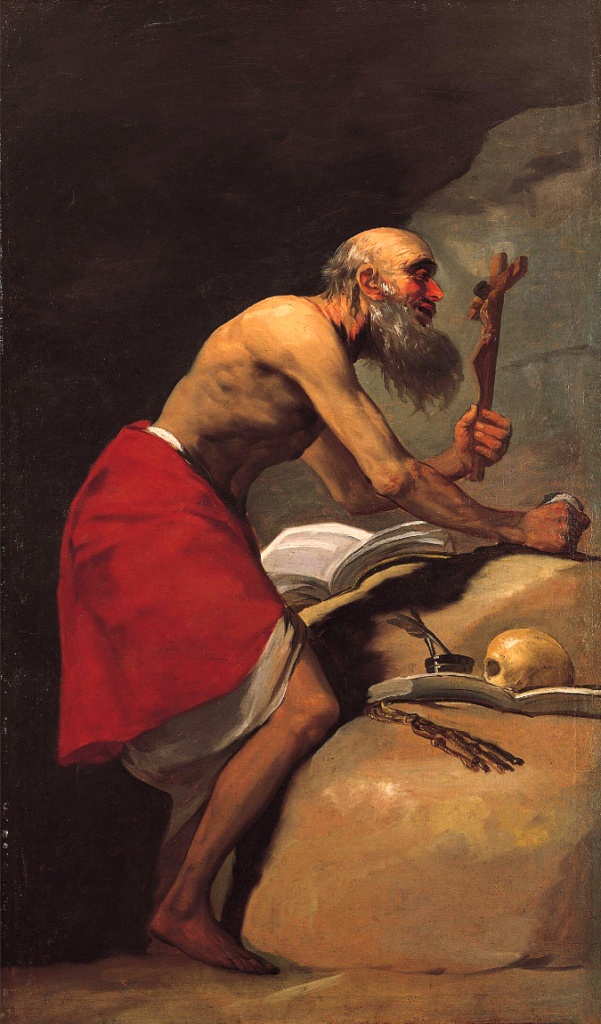Translation of the Epistle for the Eighth Sunday After Pentecost
Brethren, we are debtors, not to the flesh, to live according to the flesh; for if you live according to the flesh, you shall die but if by the Spirit you mortify the deeds of the flesh, you shall live. For whoever are led by the Spirit of God, they are the sons of God. For you have not received the spirit of bondage again in fear, but you have received the spirit of adoption of sons, whereby we cry, Abba (Father). For the Spirit Himself gives testimony to our spirit, that we are the sons of God and if sons, heirs also, heirs indeed of God, and joint heirs with Christ.
Continuation of the Holy Gospel According to St. Luke
At that time, Jesus said to His disciples this parable: There was a certain man, who had a steward; and the same was accused unto him that he had wasted his goods; and he called him, and said to him: How is it that I hear this of thee? Give an account of thy stewardship, for now thou canst be steward no longer, And the steward said within himself: What shall I do, because my lord takes away from me the stewardship? To dig I am not able; to beg I am ashamed. I know what I will do, that when I shall be put out of the stewardship, they may receive me into their houses, Therefore calling together every one of his lord’s debtors, he said to the first: How much dost thou owe my lord? But he said: A hundred barrels of oil. And he said to him: Take thy bill, and sit down quickly, and write fifty. Then he said to another: And how much dost thou owe my lord? Who said: A hundred quarters of wheat. He said to him: Take thy bill, and write eighty. And the lord commended the unjust steward, as much as he had done wisely: for the children of this world are wiser in their generation than the children of light. And I say to you: Make unto you friends of the mammon of iniquity, that when you shall fail, they may receive you into everlasting dwellings.
Transcription of Homily
The Saving Words of the Gospel.
We are debtors.
In the Name of the Father, and of the Son, the Holy Spirit, Amen.
If this parable leaves you scratching your head, have no fear. St. Jerome wrote Augustine and said, “I don’t understand it. Can you explain it to me?” So, you’re in good company. It seems that for whatever we can say about it, that Our Lord is the Landowner, and each one of us is the Unfaithful Steward who has been entrusted with so much from the time of our baptism, and subsequent graces that He’s given to us, and what Our Lord has gotten in return is disproportionate, and not in the favorable sense, is disproportionate to His investment. I think each one of us can say we have not given back what we have received, and that for the hundred that Our Lord gave us, we, or none of us, can give back a hundred. And that’s not a problem, it’s just our situation. The only one who cooperated perfectly with grace in every instance was Our Lady.
And so, ultimately this parable is about the stewardship of grace: How do I give our Lord a fruitful return on His investment? The foundation for that to be possible is we have to have in first place the life of grace, habitual grace. To be in a state of grace then, in other words, through the sacramental life, and then our prayer, and our virtue. Those are the three ordinary means of salvation, and, then by degree, the means of sanctification along the way. If we are in a state of grace, Our Lord sends us actual graces. We cannot receive actual grace if we are not in a state of grace. So, if there’s no habitual grace, there’s no actual grace. Habitual grace is meant to be static. It’s not meant to be changing – go in and out of grace. That’s not the idea. Rather, that we have a habitual state of grace, which then is open. It’s fertile territory for actual graces.
Actual graces come in an instant and they don’t hang around. They are for us to act on immediately. And this immediate response renders fruits that are disproportionate to our own effort. If we are slow in responding and, nonetheless respond positively, there will be fruits but not as many had we responded immediately. If we do not respond, then it’s as if there were a small plant that we squash, and it will bear no fruit, and all of the subsequent actual graces that would have come from this initial generous response to grace then are frustrated. And, this is why Agustin says, I trembled before the grace of God that comes my way never to come again. Why? Because these are unrepeatable.
The grace that Our Lord sends us in an instant was in His Mind before the creation of the world as a grace, a gift, a created grace, He wanted to give me in a particular moment, and what I do with that then determines whether that dies or bears fruit. And this is each one of us: We all have a history of cooperation with grace, of hesitation before grace, of spurning grace. Ultimately, this parable is about an important aspect of the spiritual life called fidelity to grace, and fidelity to grace is the generous, prompt, joyful response to what Our Lord is asking for us in that moment. And this is something that is possible if the conditions are right.
Obviously, those three ordinary means of salvation have to be at work; sacramental grace, prayer, and virtue. But on top of that, we have other things at work; there other voices, there are other demands that are made upon us. We have our disordered passions – and the passions are blind, but they’re not only blind, they’re blinding if we give in to them. And so, we have to modify ourselves. We have to deny ourselves legitimate goods in order to have a deeper participation in the One who is good.
St. John of the Cross says something that’s very profound in just a few words. He says, The unpenitential man will never understand how God works on him. In other words, if we are not mortifying ourselves, if we’re not abnegating ourselves, if we’re not denying ourselves, we won’t understand how the devil is present, and he’s at work now. On the other hand, when we start to deny our passions, we start to deny our likes, and we overcome our disordered attachments — how do we do that? Through attachment to the Heart of Christ.
So, and it’s very simple, our increased prayer life, adoration, mental prayer, recollection during the day, the more we fill our minds and our hearts with the love of Christ the more He reveals to us the relative value of all these other goods, and we start to see that they don’t really deserve a very important place in our lives.
We’re Catholics, we don’t call material things evil. We just call them relative, and they have a good role to play but that’s always in the order of means; as a means. When we take our attachments, our likes, our belongings, whatever it may be, our plans, could even be spiritual goods, we take them as ends in themselves, we start to see things with less clarity. And we start to see Our Lord with less clarity, things, and ourselves. It’s all relational. It’s all relational. And so, this is not about whether I break rules, or live according to rules; it’s about relationships. As Paul says in this Epistle, he says, We are debtors, but then he goes on to say, but we’re children of God. And so, our relationship is what determines our action.
If I am a grateful child of God, and I’m giving Him everything He deserves, well, that means everything, the good and the bad. Paul says elsewhere, whether you eat or drink do it to the glory of God. And so, we don’t call material things bad, we just call them relative to this one absolute good. So, if I’m mortifying myself, if I’m living a recollected life, and the life of sacraments and virtue, we start to see things with more clarity. This fidelity to grace is a work of justice because Our Lord deserves it. It’s also work of charity because it’s to be done with love, great love for Him who loves us.
There’s this enigmatic ending to this parable today: Make unto your friends of mammon of iniquity that when you shall fail, they may receive you into everlasting dwellings. What does that mean? Well, we’re not to make friends with the mammon of iniquity – mammon of iniquity here means money – but rather we make friends with it, we use it. So, what is he saying? We use our belongings, we use these creative things, that Our Lord and His providence has allowed us to have, for the good of the Church, for the good of others. It’s almsgiving.
And so, when we exercise this detachment from these goods, our money and our belongings, we exercise a certain detachment, we start to make up for all of those lost profits and interests that Our Lord didn’t get from His original investment. And so, rather than confusing us still more with His last line, He’s actually giving us the solution here. It is precisely in this detachment so that we can be attached to Him. And so, the more we are attached to Him, the more we are recollected, and the more we think about Him, the more we love Him, the more we surrender ourselves and try to do what we know please Him, the greater the return on His investment. And may that be so.
In the Name of the Father, and of the Son, the Holy Ghost. Amen.
— Fr. Ermatinger




